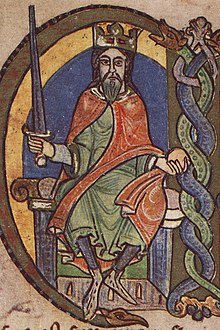In 2023 St. Fillan’s church will celebrate it’s 900th anniversary. Therefore we are preparing by looking what institutions started in the 1120’s. The previous reflections have shown that King David had an important role.

David was a 12th century king of Scotland who contributed much to his country’s development through religious and administrative reform.
David was born in around 1080, the youngest son of Malcolm III and his wife Margaret (later canonised). He spent his childhood at the English court, where his sister had married the king’s brother, Henry, who became king of England in 1100. In around 1113, David married Matilda, daughter of the earl of Huntingdon – through this marriage he acquired large estates in England.
In 1123, David succeeded his brother Alexander as king of Scotland. He was deeply religious, overseeing a religious revival and organising the building of many abbeys and monasteries.

He also made practical administrative improvements, granting town charters and introducing the first standard coinage.
Henry I of England died in 1135 and was succeeded by his daughter Matilda, David’s niece. Civil war broke out between Matilda and her cousin, Stephen, who challenged her throne. David invaded England, ostensibly in support of his niece but also to try and extend his kingdom. He was defeated at the Battle of the Standard in 1138, but continued his campaign and managed to secure a Scottish hold on a large part of northern England. He also had his son, Henry, accepted as earl of Northumberland. However, his son died in 1152, and David himself died on 24 May 1153, leaving the throne to pass to his 12-year-old grandson Malcolm IV.